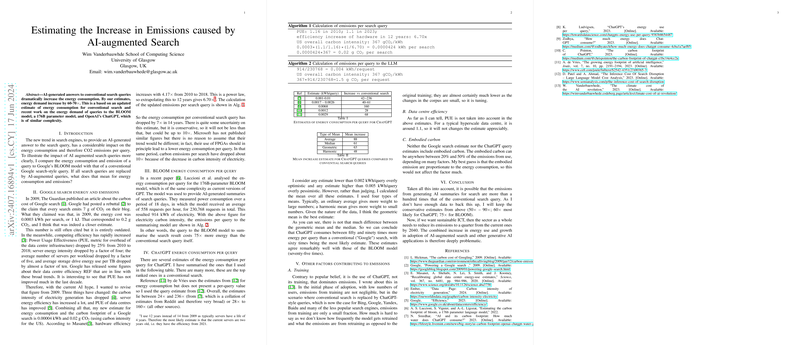Evaluating the Environmental Impact of AI-Augmented Search
The paper by Wim Vanderbauwhede critically examines the environmental impact of AI-augmented search engines on energy consumption and carbon emissions. Specifically, the paper estimates the increase in emissions resulting from integrating AI-generated responses into traditional search queries, contrasting these with conventional search mechanisms. The investigation centers around models akin to Google's BLOOM and OpenAI's ChatGPT, both exemplars of large-scale transformer-based LLMs.
Key Findings and Methodology
Vanderbauwhede argues that AI-augmented search queries result in significant energy consumption and CO emissions increases. The analysis reveals that AI-generated search summaries consume between 50 to 90 times more energy per query than conventional search queries, with 60 times being the central estimate. This figure is corroborated by referencing comparable results for the BLOOM model, estimated at approximately 75 times more energy.
For context, the paper traces the evolution of energy usage metrics and carbon intensity from 2010 to 2023, acknowledging the advancements in data center efficiencies and reductions in electricity carbon intensity, which served to mitigate the overall carbon emissions of traditional search queries significantly during this period. Algorithmic calculations provide a detailed account of these trends, reinforcing the necessity to recalibrate carbon emissions estimates in light of AI augmentation.
Examination of AI Models
The paper offers a detailed comparative analysis of AI models, such as ChatGPT, underscoring the diverse energy consumption estimates reported in the literature. These estimates span greatly, influenced by factors such as data center Power Usage Effectiveness (PUE) and carbon intensity measurements, yet they consistently indicate a dramatic escalation in energy demand when deploying LLMs for search enhancements.
Implications and Broader Impact
The environmental implications of this increase in energy consumption are profound. The paper posits that the practicality and sustainability of AI-augmented search technologies face substantial challenges if the sector's ambition is to drastically reduce emissions by 2040. The current trends of integrating generative AI within search engines, including those operated by big tech companies like Bing, Google, and others, contribute to a trajectory that could exacerbate the sector's carbon footprint without appropriate mitigation strategies.
Furthermore, the paper discusses the relative contributions of model training and inference. It suggests that while emissions from training AI models are significant initially, the emissions are primarily driven by the large-scale deployment and frequent querying of these models.
Future Directions
The author calls for continued research into optimizing the efficiency of AI models to mitigate their environmental impact. This includes exploring architectural innovations, improving energy efficiency through hardware and software optimization, and integrating renewable energy sources into data center operations. Additionally, examining the role of embodied carbon in the lifecycle assessment of AI models warrants further exploration.
This important paper contributes a measured evaluation of AI's environmental costs, emphasizing the need for sustainable AI deployment strategies in a rapidly evolving technological landscape. The findings suggest a pressing need for the computing industry to adopt environmentally conscious practices as AI technologies continue to gain traction across applications.
